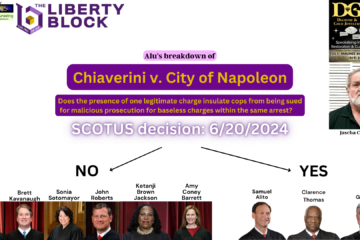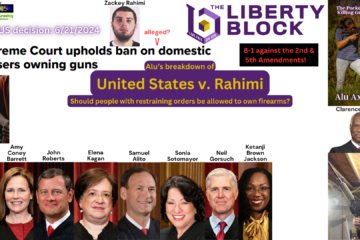After a year and a half in office, I think that I’ve seen enough to make a judgment on President Trump: He is wildly unpredictable and may have zero consistent principles.
Other than perhaps ‘America First’, Trump seems to flip back and forth on nearly every major (and minor) issue. Trump ran on non-interventionism, yet he continues to bomb nearly every country that Obama did. He campaigned on ending all illegal immigration and ending DACA, and then offered amnesty to millions of ‘Dreamers’ and continues nearly the exact same immigration policies that Obama had in place (which involved millions of deportations, unbeknownst to many Americans). He has flipped from supporting absolute gun rights to supporting stricter gun control than anything passed by Obama – and boasting about it. He has flipped on marijuana policy, taxes, and so many other issues. Many people say that Trump often agrees with and implements the proposals of the last person he speaks with. This may in fact be the case. He may actually hold zero consistent principles. As the old joke (attributed to Groucho Marx) goes: “These are my principles. If you don’t like them, I have others.” All in all, Trump has made some very good and very bad decisions during his first 18 months in office. As such, we’ve written this article that focuses on the bad and another one that focuses on the good.
The Bad
1) Increased Civil Asset Forfeiture
In July of 2017, The Washington Post reported that Trump and his Attorney General were enacting a new plan to increase the legalized theft perpetrated by law enforcement, known as ‘civil asset forfeiture’. The practice involves local, state, or federal law enforcement appropriating money, guns, drugs, or any other form of property from individuals based only on suspicion that the property might somehow be involved in a crime. This is not the same as taking heroin from dealers once they are convicted and sent to prison. This is not simply taking guns from violent gang leaders after they are charged with mass murder. This theft occurs without any convictions, warrants, or even charges being filed against a person. Indeed, law enforcement officers can take any property they wish, as long as they state that they believe that the property could somehow theoretically be involved in some crime in the past, present, or future. Trump, Sessions, and the DOJ are now encouraging state and local law enforcement to steal even more than in the past using this criminal practice. We’ll circle back to government officials taking things from citizens without due process later on in the article.
2) Appointed/Nominated Authoritarians & Cronies
In addition to nominating Jeff Sessions (who had previously been a politician for 43 years) to be the Attorney General (the head of the DOJ), President Trump appointed many other authoritarians and political cronies to high positions – just like every president in modern times surely has. Trump nominated his friend and Exxon CEO, Rex Tillerson to be Secretary of State. I didn’t trust Tillerson. A little over a year later, Trump asked Tillerson to resign and replaced him with CIA Director, Mike Pompeo. I don’t trust him either. Trump made Gina Haspel the new CIA director. I don’t trust her, either. Trump appointed Elaine Chao, the wife of the most powerful man in the US Senate to be secretary of transportation. I don’t trust her, either. If you are beginning to notice that I don’t generally trust powerful Washington politicians, you’d be correct. Trump has appointed many officials in his first 18 months, most of whom I know much too little about to judge. I assume that most are typical politicians and that at least some are purely evil authoritarians. Some, however, seem to support freedom in some instances. We’ll get to those officials later in the article.
3) Omnibus/Spending
Despite claiming to be ‘unhappy’ about it, Trump signed a $1.3 trillion omnibus spending bill, which funded the federal government for the year. In addition to being horribly reckless and authoritarian, omnibus bills are illegal. Yet, they have been common practice in Washington for decades. Trump ran his campaign on fiscal responsibility, yet he signed the largest spending bill in US history. Despite campaigning as the ultimate pro-life and low-tax candidate, Trump’s first spending bill continued to give federal taxpayer dollars to Planned Parenthood, the nation’s largest abortion provider. This 2,232-page spending bill was written by leadership (great Americans like Schumer, McConnell, and Pelosi wrote this bill) and only given to the legislators hours before the vote was to take place – meaning that they could not possibly read it before they voted on it. In this interview, US Senator Mike Lee explains that the US government is no longer representative of the American people. A few thousand voters elect representatives who then ‘represent’ hundreds of thousands of people. Even those representatives do not actually have a say in writing the important bills and they sometimes can’t even read the bills until hours before the vote takes place. Congressman Massie and other congressmen explain in this new series just how little power our representatives have in passing laws. From what I understand, spending under Trump continues to increase rapidly every year, just like it has for decades. Vetoing the omnibus bill would have been the perfect opportunity for Trump to show that he was different, and demonstrate his libertarian doctrine on spending, and it would have been the ultimate ‘screw you’ to the establishment which has grown accustomed to writing these massive spending package bills and then forcing them into law.
4) Market Intervention
Conservatives generally claim to support a totally free market, meaning an economy with no government involvement. Trump’s campaign seemed to have a more ‘America first’ feel to it than a ‘free market’ feel. Trump often mentioned in campaign speeches that he will use his governmental powers to ensure that businesses remain in the US. In this instance, Trump has generally kept his word. As promised, Trump did convince the air conditioning goliath, Carrier to remain in the US despite their plan to move manufacturing to the cheaper labor market in Mexico. Many conservatives willfully ignore how he accomplished this, though. This was accomplished by threatening massive tariffs on the company in the event that they moved some production out of the US. Tariffs result in increased costs for the end consumer, which would be Americans, in this case. Trump has also been meddling in Amazon’s business and he’s imposed tariffs on foreign products that have hurt Americans instead of helping them. I believe that the less the government interferes with the market, the more prosperous (and free) the people will be.
5) Trump Violated The 2nd Amendment
On at least 2 occasions, President Trump has demonstrated his disregard for the 2nd amendment (as well as property rights and self-defense rights). In the wake of the tragic mass shootings in Nevada and Florida, some politicians began to support laws that empowered law enforcement officials to confiscate firearms from people who seemed dangerous. ‘Red flag laws’ circumvent the need for due process, in which a standard warrant, conviction, or proof of insanity might be required in order to confiscate someone’s property. In February, Trump said that he wants law enforcement to take firearms away from individuals before due process occurs, without any charges, warrants, or convictions against the person.
In March, Trump tweeted that he had directed the ATF to reclassify bump stocks so that they could be regulated/banned by the federal government. Could the ATF do this? Even the Obama-Holder administration, the most anti-gun administration I’ve ever known admitted that such a law could not be created by a federal agency. They believed that the House and Senate would be required in order to pass such a law. They are all incorrect, however. Even Congress cannot make any laws regarding weapons without first passing a constitutional amendment. A simple bill would not suffice. This wildly authoritarian decision by President Trump earned him his first ‘Statist of the Month’ award from The Liberty Block. If this results in federal ‘red flag laws’ passing or if the ATF does execute Trump’s plan to redefine bump stocks, Trump will have passed more gun control than President Obama.
6) Corona-fascism and the worst vaccine ever
Trump was the President when the scamdemic began. He empowered tyrannical psychopaths like Fauci and Birx to turn the united states into a medical technocracy. He also presided over ‘Project Warp-Speed’, rushing the COVID vaccines through to approval. He pressured us to receive the shots and he still stands by them to this day. Despite the infinite evidence of the shots being very dangerous and very ineffective, he has yet to admit he was wrong. If you love corona-fascism, you have Trump to thank!
7) A member of the World Economic Forum
Donald Trump spoke at the WEF annual meeting as recently as 2020. His full speech is still available to be read online. He does not seem to have an issue with the leftist globalist organization and did not until very recently.
Note: I purposely neglected to address foreign policy, since I believe that those who do not work in the State Dept., White House, CIA, Pentagon, etc. probably know little to nothing about what is actually occurring in regard to foreign policy. Obama’s foreign policy seemed horrible, and Trump is probably not changing much of it. That’s all I know.
I also did not touch on immigration, because I seemingly have an incredibly unique perspective on immigration policy, and my honest opinions on the matter would be best explained in another article.
I hope you found this article insightful and please comment below with your thoughts on the best and worst policy decisions made by President Trump!
Thank you very much!


